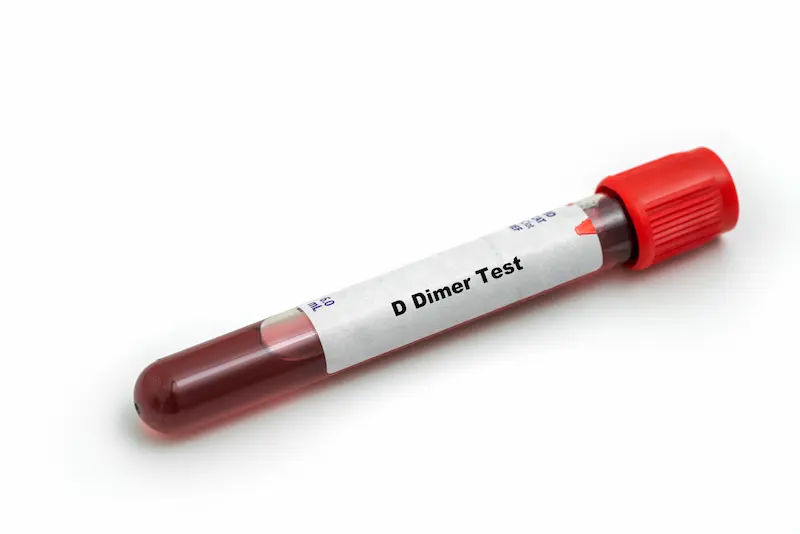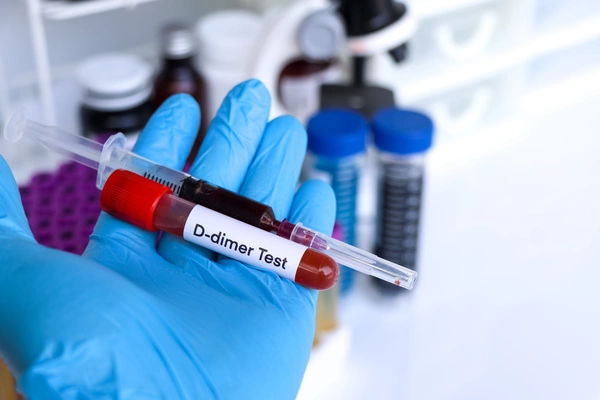D-Dimer Test Overview and Procedures
Know about the D-dime test, what it is, why it is done, how the test is done, interpret the results and how to manage the clotting and more.

Written by Dr. M L Ezhilarasan
Reviewed by Dr. Shaik Abdul Kalam MD (Physician)
Last updated on 3rd Sep, 2025

Introduction
If you or a loved one has been advised to take a D-dimer test, you might have questions about what it is, why it’s needed, and how it’s done. This guide will explain everything in simple terms, so you can feel informed and at ease.
What Is a D-Dimer Test?
A D-Dimer test is a blood test that checks for the presence of D-Dimer, a protein fragment produced when a blood clot dissolves in your body.
This test helps doctors determine if you have an abnormal blood-clotting condition, such as:
• Deep Vein Thrombosis (DVT) – A clot in a deep vein, usually in the legs.
• Pulmonary Embolism (PE) – A clot that travels to the lungs.
• Disseminated Intravascular Coagulation (DIC) – A serious condition causing excessive clotting and bleeding.
Consult a General Practitioner for Personalised Advice
Why Is the D-Dimer Test Done?
Doctors recommend this test if you have symptoms that suggest a blood-clotting disorder, such as:
• Leg pain, swelling, or redness (possible DVT)
• Sudden shortness of breath, chest pain, or coughing up blood (possible PE)
• Unexplained bruising or bleeding (possible DIC)
• Monitoring after surgery or prolonged immobility
The test helps rule out dangerous clotting conditions quickly.
How Is the D-Dimer Test Performed?
The procedure is simple and similar to other blood tests:
1. Preparation – No fasting is needed. You can eat and drink normally before the test.
2. Blood Sample Collection – A healthcare professional will clean your arm, insert a small needle, and draw a blood sample into a tube.
3. Processing – The sample is sent to a lab where technicians measure D-dimer levels.
4. Results – Typically available within a few hours to a day, depending on the lab.
Understanding Your D-Dimer Test Results
It includes:
• Normal Result (Negative) – Low D-dimer levels mean clotting is unlikely.
• Abnormal Result (Positive) – High D-Dimer levels suggest possible clotting, but further tests (like ultrasound or CT scan) may be needed to confirm.
Note: A positive result doesn’t always mean a clot is present. Other conditions (like infections, pregnancy, or recent surgery) can also raise D-dimer levels.
What If My Test Is Positive?
If your D-Dimer is high, your doctor may recommend:
• Imaging tests (Ultrasound, CT scan, or MRI) to locate clots.
• Blood thinners (anticoagulants) if a clot is confirmed.
• Follow-up tests to monitor clotting risks.
Tips for Managing Clotting Risks
If you're at risk for blood clots, these lifestyle changes can help:
• Stay Active – Avoid sitting for long periods; take short walks.
• Stay Hydrated – Drink plenty of water to keep blood flowing smoothly.
• Wear Compression Stockings – Helps prevent DVT if you’re immobile.
• Quit Smoking – Smoking increases clotting risks.
• Maintain a Healthy Weight – Reduces strain on circulation.
When to See a Doctor?
Seek immediate medical help if you experience:
• Sudden leg swelling or pain
• Chest pain or difficulty breathing
• Coughing up blood
Early detection can prevent life-threatening complications.
Final Thoughts
The D-Dimer test is a simple yet crucial tool to detect abnormal blood clotting. If you have symptoms or risk factors, don’t ignore them—early testing can save lives. Always follow your doctor’s advice and take preventive steps to stay healthy.
Consult a General Practitioner for Personalised Advice
Consult a General Practitioner for Personalised Advice

Dr. Siri Nallapu
General Practitioner
5 Years • MBBS
Hyderabad
Apollo 24|7 Clinic, Hyderabad

Dr D M Karthik
General Practitioner
4 Years • MBBS, Fellowship in Diabetes Mellitus, Advance certificate in Diabetes Mellitus, Derma Nutrition Certification
Visakhapatnam
Apollo 24|7 Clinic - Andhra Pradesh, Visakhapatnam

Dr Divya Lekha Gunta
General Practitioner
10 Years • MBBS, MD (Pathology)
Visakhapatnam
Apollo 24|7 Clinic - Andhra Pradesh, Visakhapatnam

Dr. Rajib Ghose
General Physician/ Internal Medicine Specialist
25 Years • MBBS
East Midnapore
VIVEKANANDA SEBA SADAN, East Midnapore
Dr Anjali
General Practitioner
32 Years • MBBS
Noida
Dr Anjali Care Plus Clinic, Noida
Consult a General Practitioner for Personalised Advice

Dr. Siri Nallapu
General Practitioner
5 Years • MBBS
Hyderabad
Apollo 24|7 Clinic, Hyderabad

Dr D M Karthik
General Practitioner
4 Years • MBBS, Fellowship in Diabetes Mellitus, Advance certificate in Diabetes Mellitus, Derma Nutrition Certification
Visakhapatnam
Apollo 24|7 Clinic - Andhra Pradesh, Visakhapatnam

Dr Divya Lekha Gunta
General Practitioner
10 Years • MBBS, MD (Pathology)
Visakhapatnam
Apollo 24|7 Clinic - Andhra Pradesh, Visakhapatnam

Dr. Rajib Ghose
General Physician/ Internal Medicine Specialist
25 Years • MBBS
East Midnapore
VIVEKANANDA SEBA SADAN, East Midnapore
Dr Anjali
General Practitioner
32 Years • MBBS
Noida
Dr Anjali Care Plus Clinic, Noida

